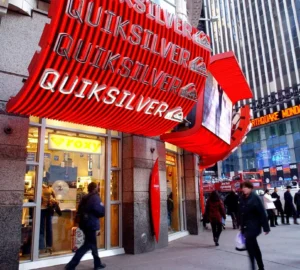Advertisement
Marks & Spencer (M&S), the iconic British retailer, has long been a leader in fashion, food, and home goods. Known for its commitment to quality and service, M&S has made a profound impact on the global retail landscape. In recent years, the brand has taken significant strides to redefine what it means to be a retail leader, combining innovation with a firm commitment to sustainability. This approach not only ensures long-term growth but also sets a benchmark for other retailers worldwide.
Innovating to Stay Ahead of the Curve
In today’s fast-paced retail environment, staying relevant requires constant innovation. M&S has embraced technology and modern retail strategies to maintain its competitive edge. From AI-powered customer service solutions to personalized shopping experiences, M&S has implemented cutting-edge technologies to enhance its operations and engage customers in new ways .
.
One of the standout initiatives is the brand’s “Smart Shop” concept, which leverages artificial intelligence to improve inventory management and streamline the shopping experience. By using predictive analytics, M&S can optimize product placement, reduce waste, and ensure that customers find exactly what they are looking for, when they need it.
Moreover, M&S has embraced the world of e-commerce, with a robust online platform and an efficient delivery system that allows customers to shop seamlessly from the comfort of their homes. During the COVID-19 pandemic, M&S significantly boosted its online offerings, investing in technology to ensure the continued accessibility of its products and services.
The brand has also embraced omnichannel strategies, blending its physical stores with digital platforms to create a seamless shopping experience. Whether through the M&S app, website, or in-store self-checkout options, customers are given more ways to interact with the brand than ever before.
Leading the Way in Sustainability
Beyond technological innovation, M&S has positioned itself as a frontrunner in the sustainable retail movement. Its commitment to sustainability isn’t just about offering eco-friendly products but about transforming the entire supply chain, from sourcing to packaging.
Sourcing with Purpose
M&S’s efforts to ensure that its products are sourced sustainably have had a profound impact. The brand is dedicated to using responsibly sourced materials, such as organic cotton, recycled polyester, and sustainably sourced palm oil. Additionally, M&S has partnered with global organizations like the Fairtrade Foundation and the Rainforest Alliance to promote ethical sourcing practices. These initiatives ensure that products sold under the M&S label not only meet high environmental standards but also support fair wages and better working conditions for producers around the world.
Greener Packaging
One of the most notable achievements in M&S’s sustainability efforts has been its drive to reduce packaging waste. The brand has introduced recyclable, reusable, and compostable packaging for many of its products, significantly reducing its carbon footprint. In 2020, M&S announced its pledge to make all its packaging recyclable or reusable by 2025. This initiative is part of the company’s broader goal to become a net-zero business by 2040.
Food Sustainability
When it comes to food, M&S has been a pioneer in making sustainability a key part of its offerings. The retailer has introduced various sustainable food ranges, including plant-based options and products with reduced environmental impact. It has also implemented a policy to reduce food waste by donating surplus food to charities and community projects. In 2021, M&S announced a partnership with the environmental charity WWF to further tackle climate change and promote biodiversity.
Championing Ethical Labor Practices
M&S’s commitment to sustainability extends beyond the environment to include social responsibility. The retailer has made significant strides in ensuring ethical labor practices across its global supply chain. The company has been vocal in its efforts to promote fair wages, safe working conditions, and equal opportunities for workers throughout its network of suppliers.
In 2022, M&S introduced a new supplier code of conduct, which includes strict guidelines around labor practices, including no child labor, fair wages, and the right to unionize. Through ongoing audits and collaborations with global watchdogs, M&S aims to drive positive change in the global supply chain and set new standards for ethical business practices.
A Vision for the Future
M&S’s dedication to innovation and sustainability is not just a short-term strategy but a long-term vision for the future. The company’s ambitious sustainability goals reflect its commitment to addressing the environmental challenges of the 21st century. By focusing on reducing its carbon emissions, minimizing waste, and supporting responsible production practices, M&S is paving the way for a new era of retail—one that values people, the planet, and profit equally.
In its most recent report, M&S outlined its goal to become a net-zero business by 2040, with interim targets for 2025. It is also aiming to reduce food waste across its operations by 50% and has committed to a 100% circular economy model for its clothing and home goods by 2030. These goals are not just aspirational; they are backed by robust plans, investments, and partnerships with industry leaders and environmental organizations.
As the world faces increasing pressure to address climate change and sustainability challenges, M&S stands at the forefront of a retail revolution. By embracing innovation in every aspect of its business and placing sustainability at the core of its operations, M&S is redefining what it means to be a responsible, forward-thinking retailer.
Marks & Spencer is redefining the future of retail through its focus on innovation, sustainability, and ethical business practices. Its efforts to embrace cutting-edge technology, reduce environmental impact, and support fair labor practices have not only strengthened its position in the marketplace but have also set an example for other brands to follow. As the world increasingly demands businesses to be both profitable and responsible, M&S is proving that it is possible to lead with purpose while delivering excellence in retail.
By continually innovating and making sustainability a core pillar of its business, M&S is not just keeping up with industry trends but is actively shaping the future of retail—one that balances economic growth with social and environmental responsibility.









